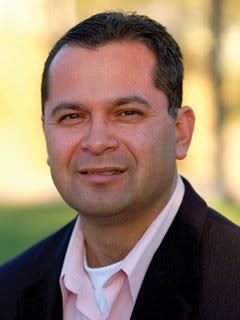Crossposted at the California High Speed Rail Blog
In a move they’ve been telegraphing for weeks, a group of wealthy NIMBYs have convinced the cities of Menlo Park and Atherton to join forces with the Planning and Conservation League, the California Rail Foundation (which has all of 3 members) and “lawsuit-happy activist” David Schonbrunn of TRANSDEF and sue to block high speed rail. Their claim is that the EIR/EIS that was adopted last month by the California High Speed Rail Authority violates the California Environmental Quality Act (CEQA) – but what is really going on is that a small coterie of long-time HSR deniers are greenwashing themselves and using the courts to stop one of the most important projects in state history.
Menlo Park and Atherton’s objections are perhaps the most absurd. Driven by a handful of wealthy landowners, including Morris Brown and Martin Engel, their argument is that HSR would harm the aesthetics of their wealthy enclave:
The proposed route of the project runs down the heart of Menlo Park and Atherton on a narrow corridor occupied by CalTrain. The necessity of 4 tracks, where there are currently only 2 as well as needing the high 15 foot berm for the rail bed to accommodate grade crossings is of concern to both communities. With a minimum of 100 feet of width needed , as well as overhead catenaries for the electrical power to power the train, the impact in both communities is severe.
This is a comical, classic NIMBY objection. They’re arguing that clean, sustainable mass transit, which California so desperately needs, should be stopped because it might not look pretty in two of the state’s wealthiest communities?! That they’re making an environmental argument is even more ridiculous. Currently Caltrain is powered by diesel trains and has a high rate of accidents caused by cars and people wandering onto the tracks. HSR would solve both problems by electrifying the tracks and physically separating them from the surrounding landscape, eliminating air pollution and making the entire corridor much safer.
Morris and Engel are inherently opposed to this project, and have spent months trying to dredge up any thin reed they can find to kill HSR. They never have proposed alternatives to how California can deal with the energy and climate crisis, and seem to prefer the failed status quo. And why not? They’ve got their land already, who cares about the masses?!
NIMBYism is one thing. The involvement of the PCL and TRANSDEF, two groups that have done good work in the past on containing sprawl, in this lawsuit is another. It’s a profound disappointment to see them engaged in an effort to kill the HSR project. Surely they realize that a lawsuit filed three months out from the election jeopardizes the passage of Proposition 1. They don’t have an alternative political strategy either on this, either for passing the HSR bonds or for dealing with our state’s transportation issues.
Their reason for suing involves the choice of Pacheco Pass to connect the Bay Area to the Central Valley instead of the Altamont Pass. As this blog has repeatedly argued, both alignments had their good points and their bad points – but neither was clearly superior to the other. The most important thing for those who truly want to see HSR built in California is that we make a choice and stick with it. The California High Speed Rail Authority chose Pacheco, and so these Altamont supporters are choosing to sue.
The arguments against Pacheco are weak and by no means enough to suggest HSR should not be built. We dealt with the sprawl issue on Sunday but more detail is warranted. Much of the Pacheco Pass region cannot be built upon for topographical or legal reasons. A station at Los Banos has been permanently canceled. Gilroy has an urban growth boundary that could be stronger, but it exists. Moreover, HSR as a station-oriented system would primarily encourage growth near the station itself, not in far-flung exurban areas. Finally, these critics have consistently ignored or dismissed the reasons why sprawl is in mortal danger – without cheap oil and cheap credit, sprawl is simply not possible.
More to the point, sprawl is a problem whether we build HSR or not. So why hold HSR hostage to an issue that we have to solve no matter what? This really is a case of the perfect being the enemy of the good. HSR would mitigate against sprawl, would reduce carbon emissions, save on oil consumption, and promote mass transit riding habits. Why on earth would two organizations who are usually supportive of mass transit try to kill HSR?
The Altamont option isn’t perfect either. It would require a new rail bridge across the bay, which would bring environmental problems of its own. The cities of Fremont and Pleasanton promised to sue if it were built, while the cities along the Pacheco route are supportive. On the whole there is no clear and compelling case to choose Altamont over Pacheco – and besides, if we really want HSR to be built, we need to rally around the project and ensure it passes, not drag this out forever. It’s like Hillary vs. Obama all over again.
The deeper problem is that these groups have no sense of urgency. Al Gore and Van Jones have both explained the need for environmentalists and conservationists to come up with solutions NOW if we are to blunt the momentum of the “drill now, drill everywhere” crowd. We cannot build the public momentum for mass transit solutions if environmental groups spend their time in opposition, It is time to start showing Californians that high speed rail is a better deal for them than relying on wallet-busting oil prices, a failing airline industry, or carbon-spewing methods of travel.
The last group involved in the suit is the California Rail Foundation, headed by Richard Tolmach. Their opposition sounds dire, but the CRF has all of three members. The much larger – and therefore more representative – California rail organizations have chosen not to join the suit, such as TRAC, or openly support high speed rail and Prop 1, such as RailPAC and the National Association of Railroad Passengers (TRAC’s decision on whether to endorse will be made later this month). Several chapters of the Sierra Club, including many in Southern California, are also supportive of high speed rail, suggesting something of the broad support HSR has around the environmental community.
So it’s deeply unfortunate that a small group of people upset that their favored route wasn’t picked, or upset that their wealthy communities will have safer and cleaner trains, are choosing to sue. They don’t represent the California environmental movement, they don’t represent the California transit movement, and as the election results in November will surely demonstrate, they don’t represent Californians period. Their frivolous lawsuit is a nuisance, but it won’t stop us from making the case to Californians that high speed rail is a good and necessary project.




